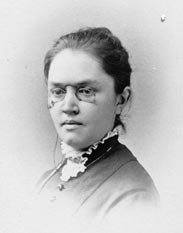Lydd
For the Reunion of the Bates Family at Quincy, August 3, 1916
FAR away on the sunny levels
Where Kent lies drowsing beside the sea,
Where over the foxglove as over the foam
The gray gull sails, is our ancient home.
Wide though we wander, something follows,
The cradle-call from a village hid
Under the cloud of rooks and swallows
That love its thatches and orchards, Lydd.
Here they sported in rustic revels,
Our sturdy forbears, while ale flowed free,
Richard and Susan and Sybil and John,
All their jollity hushed and gone;
Our grandsires proud of their scraps of Latin,
Our grandams, 'notable huswifs' all;
We may touch the very settles they sat in,
But they, like their shadows upon the wall,
Have slipped from their sweet, accustomed places,
Stephen, Samuel, Ellen, Anne.
The pewter flagons they valued so
Stand, though battered, in shining row,
But the hands that scoured them, long since folded,
Lips that smacked over them, long since dust,
Are known no more in the town they molded
To civic honor and neighbor trust.
Ah, for their quaint, forgotten graces,
Flushing raptures of maid and man,
James and Alice, Thomas and Joan,
Blood of our blood and bone of our bone!
Only the trampled slabs and brasses
That floor the aisles of the old church tell
Their dates and virtues to him who passes,
How long they labored in Lydd, how well.
Their Catholic sins have all been shriven,
And their Puritan righteousness pardoned, too.
Lax and merry, or holy and harsh,
They have flown to Heaven from Romney Marsh,
Lydia, David, Joshua, Zealous,
'Katharine Spinster,' yet still on earth
Their wraiths abide in our being, jealous
For the brief, blunt name and its modest worth.
For each of us is phantom-driven,
A haunted house where a glimmering crew
Of dear and queer ancestral ghosts
Quarrel and match their family boasts,
Color our half and fashion our noses,
Shape the deed and govern the mood;
In every rose are a thousand roses;
Every man is a multitude.
A patchwork we are of antique vagaries;
Primitive passions trouble our pulse.
'Margery, relict of Andrew Bate,'
Clement, Rachel and William hate
And adore in us. No vain sunriser
In all our clan, but he owes the praise
To some progenital dew-surpriser
Who knelt to the dawn in pagan days.
Sailors that steered for the misty Canaries,
Fishers whose feet loved the feel of the dulse,
Agnes, Simon, Julian, George,
Faithful in kitchen, hayfield and forge,
Give us our dreams, our sea-love, the voices
That speak in our conscience, rebuke and forbid.
Hark! In our festal laughter rejoices
A quavering note from the graves of Lydd.
Font size:
Submitted on May 13, 2011
Modified on March 05, 2023
- 2:14 min read
- 67 Views
Quick analysis:
| Scheme | ABCDDEFEABCGHIJKJLMNNFAFALMOOLPLPGQRRSTSTIQUULVLVWYZZ1212WB33LFBA |
|---|---|
| Closest metre | Iambic pentameter |
| Characters | 2,526 |
| Words | 451 |
| Stanzas | 1 |
| Stanza Lengths | 65 |
Translation
Find a translation for this poem in other languages:
Select another language:
- - Select -
- 简体中文 (Chinese - Simplified)
- 繁體中文 (Chinese - Traditional)
- Español (Spanish)
- Esperanto (Esperanto)
- 日本語 (Japanese)
- Português (Portuguese)
- Deutsch (German)
- العربية (Arabic)
- Français (French)
- Русский (Russian)
- ಕನ್ನಡ (Kannada)
- 한국어 (Korean)
- עברית (Hebrew)
- Gaeilge (Irish)
- Українська (Ukrainian)
- اردو (Urdu)
- Magyar (Hungarian)
- मानक हिन्दी (Hindi)
- Indonesia (Indonesian)
- Italiano (Italian)
- தமிழ் (Tamil)
- Türkçe (Turkish)
- తెలుగు (Telugu)
- ภาษาไทย (Thai)
- Tiếng Việt (Vietnamese)
- Čeština (Czech)
- Polski (Polish)
- Bahasa Indonesia (Indonesian)
- Românește (Romanian)
- Nederlands (Dutch)
- Ελληνικά (Greek)
- Latinum (Latin)
- Svenska (Swedish)
- Dansk (Danish)
- Suomi (Finnish)
- فارسی (Persian)
- ייִדיש (Yiddish)
- հայերեն (Armenian)
- Norsk (Norwegian)
- English (English)
Citation
Use the citation below to add this poem to your bibliography:
Style:MLAChicagoAPA
"Lydd" Poetry.com. STANDS4 LLC, 2025. Web. 23 Feb. 2025. <https://www.poetry.com/poem/24870/lydd>.






Discuss the poem Lydd with the community...
Report Comment
We're doing our best to make sure our content is useful, accurate and safe.
If by any chance you spot an inappropriate comment while navigating through our website please use this form to let us know, and we'll take care of it shortly.
Attachment
You need to be logged in to favorite.
Log In